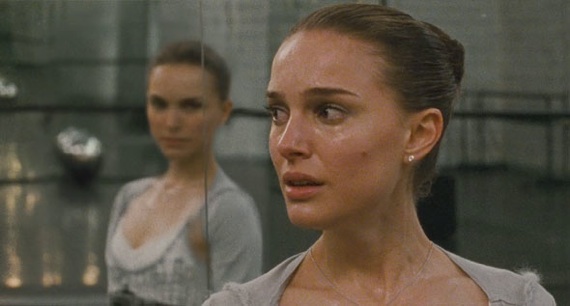The tale of a ballerina’s struggles in ‘Black Swan’ is a familiar one: a cut-throat competitive environment with catty rivals doing whatever it takes to claim the lead role; making brutal sacrifices, both mental and physical, in order to match up to the demands of a complex role; charismatic male directors hoping to draw out the potential in their starlet while simultaneously trying to get some on the side; overbearing mothers seeking to live the failed dreams of their past through their daughters whose greater talent they secretly envy. It’s always made for splendid melodrama, and ‘Black Swan’ is no different in mining from the same well, but what separates it from similar movies of the past, and what has earned it such rapturous reception from critics (five Academy nominations and a host of others) and punters alike ($230 million box office gross), is its style. Darren Aronofsky has always been a visual director, and while ‘π (1998)’ and ‘Requiem for a Dream (2000)’ were overkills in stylistic indulgence, there was a feeling that after the failure of ‘The Fountain (2006)’, Aronofsky overcompensated a little too much with ‘The Wrestler (2008)’ by dialing down the aesthetics to the extent that, externally at least, it could have been anyone’s movie.
Happily, ‘Black Swan’ represents the best balance Aronofsky has struck so far between style and substance. The film tells of the mental disintegration of Nina, a labouring ballerina who, after years of being in the shadow, finally lands the feted role of the Swan Queen. It demands from the starlet the difficult dual portrayal of the virginal white swan, and her nymphomaniacal black counterpart. Nina, played with aching commitment by Natalie Portman, is ideal for the former, what with her impeccable (and obviously repressed) manners, mousy voice and a sheltered existence in pre-pubescent bedroom crammed with teddy bears and pink accessories. She’s not such a good fit for the dark persona, however, and another ballerina, the free-spirited Lily, obviously is. She always seems to bother Nina here and there, but there’s lots of other things bothering her too. Can she find it in herself to portray both swans, and more importantly, can she do it without losing her marbles?
Thematically, narratively, ‘Black Swan’ is nothing new: the Manichaean motif, the use of mirrors to convey schizophrenia, the did-she-or-didn’t-she paranoia, the bitchy anti-camaraderie of the ballet troupe – Aronofsky obviously hasn’t felt it too low to fill his movie with a mixture of Sunday TV soap drama and a sixth-form essay on Dostoyevsky. But as befitting a man who in ‘π’ only needed $60,000 to fill the screen with more visual mayhem than a trilogy of ‘Transformers’, Aronofsky manages to eke out every last drop of suspense with the schlock material. And how: from the very first shot to the denoument, ‘Black Swan’ not only maintains a finely taut tension throughout, but also keeps the audience’s nerves consistently rattled by shrewdly employing the use of Cronenbergian body horror, while frequently colouring the movie with lurid, Argento-esque details. While not an out-and-out horror movie, ‘Black Swan’ manages to earn the viewers’ creeping sense of dread through Aronofsky’s assured handling of its lush visuals and the deft management of cinematic tricks as fleet-footed as its subject performer’s.
Speaking of which, Portman’s performance has been deservedly praised throughout the world, but it isn’t quite the bravura piece that many are claiming. For most of the movie she is more or less one-note – constant anxiety. Here and there she ventures out into Oscar-friendly territory, but right up to the ending Portman doesn’t really do anything which, outwardly at least, amounts to the traditional “explosive” acting. However, she is enormously sympathetic, never losing her audience by the simple fact that she never loses herself amidst the bedlam that goes around her. It’s deceptively studied acting, probably underappreciated in its subtle balancing of frailty and determination. Her chin perpetually creased, brows permanently furrowed, the character is struggling to avoid going crazy, the actress struggling to avoid overacting, and unlike Nina, Portman manages it. Extravagant emoting isn’t the only way to hold our attention, and Portman somehow finds a way to keep us invested without sacrificing her natural delicacy and femininity. As Nina descends further down the vortex of doubt and suspicion, her grasp on reality loosening by the frame, her performance as the Black Swan that finally arrives is not just a triumph of cinematic climax but also a vindication of Portman’s belief in her application. In many ways the adult Portman was in need of a signature, break-out performance that would finally put behind her the spectre of ‘Leon (1994)’, and this is it: entirely without the self-consciousness of ‘Closer (2004)’, the same silly little-girl-lost syndrome of ‘V for Vendetta (2006)’, or the wilfully quirky indie irresponsibility of ‘Garden State (2004)’, Nina is Portman’s statement that she can cut it at the very summit.
On a sidenote, ‘Black Swan’ bears more than a passing resemblance to ‘Perfect Blue (1997)’, the disturbing Japanese anime directed by Satoshi Kon of Madhouse studio. ‘Perfect Blue’ was more a study of the madness of obsessive fandom, but it shares with the former a heroine seemingly trapped in her own mind, and a thrilling flair for visual depiction of mental disintegration. Less indulgent, more straightforward, and also perhaps a little more affecting in its own way, it’s a suitable companion piece and well worth a watch.
8/10
